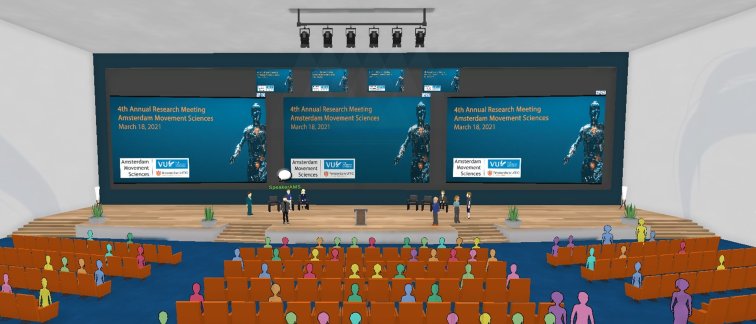‘Wow. This is amazing, a fully online conference with the same kind of feel as a real conference’ twittered a participant. A combination of real life lectures and online workshops, with the possibilities to meet up in between the sessions, made it a remarkable event.
Director Mario Maas (link) welcomed everybody and thanked Frans Nollet (link) as former AMS director, for his great work. Frans led the institute from its first beginnings in the Movement Sciences Working Group in 2016. During that time, and much to his credit, the institute has become a powerful entity in the field of movement research in the Amsterdam area and far beyond.
Director Richard Jaspers drew a picture of goals of the future: ‘The institute is already doing well. We are a large institute. Our Sport Research for instance is in the Top 10 of the world. We have many new ideas. We want to create more impact and to make our discoveries useful in practice with our expertise centres, which are embedded in the AMS programs. We also aim to work on our branding and consortia formation’. The program directors informed us about the actual developments.
A lively discussion in the several poster sessions followed. Keynote speaker Annemieke Buizer, professor Pediatric Rehabilitation gave an inspiring lecture, entitled: Moving forward: targeted treatment to improve mobility in cerebral palsy. Jelle Staleman shared his mission to climb the one of the highest mountains in an unforgettable way. Although he did not make it to the top, the process he went through was impressive and fascinating to hear. And finally came the moment that many had been anxiously awaiting: the presentation of the awards. The Outstanding Paper Award was won by Sabrina Chettouf: Are unimanual movements bilateral? The research shows that unimanual movements involve bi-hemispheric activation patterns that resemble the bilateral neural activation typically observed for bimanual movements. The second outstanding Paper Award was won by Ton Schoenmaker, entitled: Activin-A Induces Fewer, but Larger Osteoclasts From Monocytes in Both Healthy Controls and Fibrodysplasia Ossificans Progressiva Patients. This research is a well-performed trial with innovative and clinically meaningful results for a rare and complex disease.
The Best Poster Award was won by Tammie van Biemen, entitled: Into the eyes of the referee: A comparison of on-field visual search behaviour between elite and sub-elite football referees. Victor Staartjes won with his Poster: magnetic resonance imaging-based synthetic computed tomography of the lumbar spine using deep learning. Finally Moritz Eggelbusch won with his research: inflammation-induced skeletal muscle wasting: emerging role of the nlrp3 inflammasom.
The (first) Societal Outreach Award was won by Eric Voorn. He took the lead in the development and implementation of ‘B-FIT’, a training guide to prescribe and evaluate individualized home-based aerobic training in slowly progressive neuromuscular diseases. B-FIT has been made freely available through a website and has proven to be very successful, along with the development of the ReVi app. The ReVi app allows direct feedback to patients during exercise, remote supervision by physical therapists and the collection of exercise data for evaluation and research and is now being used by most patients following the B-FIT exercise program.
In short, this was a very inspiring day, in which many researchers could meet up an exchange their ideas and latest developments. We hope to see you in real life next year!
Check out the livestream for the entire event.

